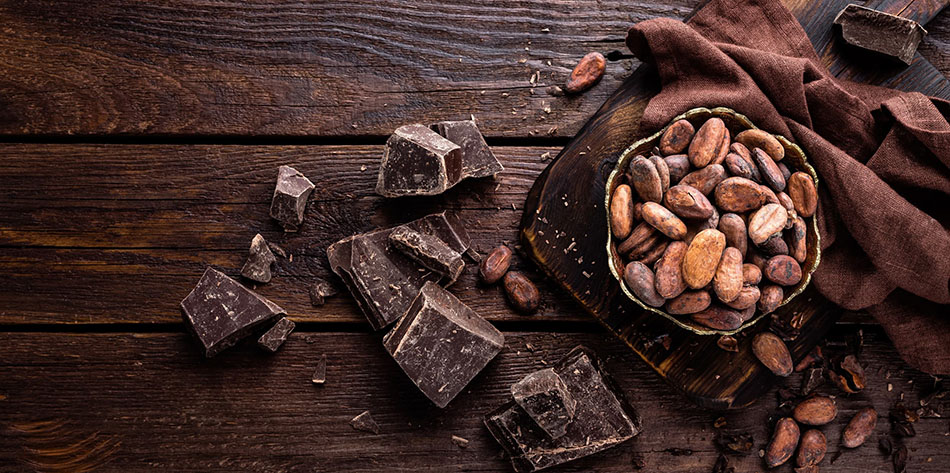
Dark chocolate contains several compounds that may have cardioprotective effects.
Valentine's Day is a day to show love for the people in your life that make it special, and what better way to do that than with a box of chocolates? Despite the rising costs of just about everything, Americans planned to spend nearly $26 billion on the romantic holiday in 2023, with more than half of that spending going toward sweet treats.
But while chocolate may be a symbol of your figurative heart, is dark chocolate good for your heart in a literal sense? If you're a chocolate enthusiast, you may be delighted to hear that the answer is yes — in moderation. Too much of anything can be bad for you, but adding chocolate — specifically dark chocolate — to your diet may have benefits.
What are the different types of chocolate?
There are three main types of chocolate: dark chocolate, milk chocolate and white chocolate.
Dark chocolate doesn't contain milk. It's made from chocolate liquor or cocoa solids, cocoa butter and sugar. Dark chocolate typically contains anywhere from 50% to 90% cocoa. Milk chocolate, as the name suggests, adds either condensed milk or milk solids to these ingredients. It contains about 10% to 50% cocoa. White chocolate has no cocoa, consisting simply of cocoa butter, sugar and milk solids.
How is dark chocolate good for your heart?
Due to its higher concentration of cocoa, dark chocolate is packed with compounds that can be good for your heart, such as flavonoids. Flavonoids are a type of polyphenols, which are naturally occurring chemicals found in plants. These compounds give fruits and vegetables, like blueberries and spinach, their color. Flavonoids are also found in red wine (more on that later) and found in the cocoa solids that make up dark chocolate.
Polyphenols have anti-inflammatory and antioxidant properties. Antioxidants protect cells from damage caused by free radicals — unstable oxygen molecules that can cause illness and premature aging. Another antioxidant found in both dark chocolate and red wine is resveratrol. Some research shows that resveratrol can lower the risk of inflammation and blood clots, in turn reducing the risk of heart disease. Resveratrol and other polyphenols also reduce oxidative stress, which occurs when there's an imbalance between free radicals and antioxidants in your body. Oxidative stress plays a major role in heart and vascular disease.
Dark chocolate also contains methylxanthines, which are alkaloids that can be found in coffee and tea. Methylxanthine can reduce oxidative stress and inflammation.
Finally, the cocoa butter in dark chocolate contains oleic acid, a heart-healthy monounsaturated fat also found in olive oil. When substituted for fats and oils that are high in saturated fat, oleic acid can potentially reduce the risk of heart disease.
What's the best dark chocolate for heart health?
While dark chocolate can have a protective effect on heart health, that doesn't mean you should overindulge. Dark chocolate is high in fat and calories, so it's important to enjoy it in moderation. Optimally, you should look for dark chocolate that has a higher percentage of cocoa, which is generally a good indicator of the amount of flavonoids it contains.
Don't expect to get the same heart-healthy effects from milk chocolate or white chocolate. Milk chocolate has a lot of sugar and fat and not enough cocoa solids to produce the same protective effects as dark chocolate. White chocolate is mainly sugar and fat and has little nutritional value.
Is red wine good for you?
Since red wine has some of the same compounds as dark chocolate, you may be wondering if it's good for you too. Some research has found that moderate red wine consumption — up to one drink a day for women and two for men — may have heart-healthy effects. Resveratrol is also found in red wine and studies show that low doses of resveratrol in patients with coronary artery disease can have protective effects on the heart.
Still, emerging research suggests otherwise. Authors of one study concluded that moderate alcohol consumption may have both positive and negative effects on cardiovascular risk. Furthermore, the World Heart Federation states that "any level of alcohol consumption can lead to loss of healthy life." Emerging research correlates alcohol use with an elevated risk of atrial fibrillation. However, the effects of regular, light alcohol consumption (up to one drink a day) remain unknown. Overall, the jury is out on whether alcohol lowers cardiovascular risk, but it is clear that increased consumption increases risk.
Protecting your heart this Valentine's Day
So, is dark chocolate good for your heart? It may be, but it shouldn't be your only choice for heart health. You don't want to overdo it in the hopes of protecting your heart since too much might have the opposite effect. Focus on a healthy diet and exercise and see your doctor regularly — but know that a glass of red wine and a couple of pieces of dark chocolate may make your heart feel good in more ways than one this year.
$webqFacilityNumber
Need a Physician?